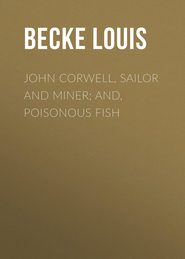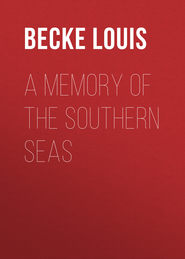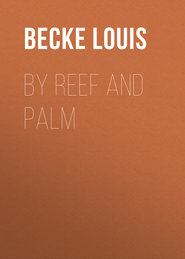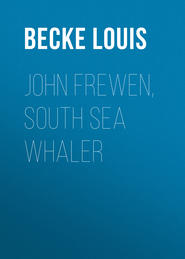По всем вопросам обращайтесь на: info@litportal.ru
(©) 2003-2024.
✖
The Tapu Of Banderah
Настройки чтения
Размер шрифта
Высота строк
Поля
“Give him £500 and tell him to hold his tongue. He’s a thundering rascal, and we must pay to shut his mouth.”
Then the two proceeded to discuss their lunch, and as they ate and drank and talked and laughed, Banderah and three or four of his men whispered together.
“Seize them from behind and bind them tightly,” said the chief, “but kill them not, for that I have promised to Challi.”
The Honourable Morcombe-Lycett had just finished his last glass of bottled beer and wanted to smoke. He had taken out his cigar-case, and, wondering at the sudden silence which had fallen upon their native guides, turned round to see where they were, and saw swiftly advancing upon himself and his companion some half a dozen stalwart natives. In that momentary glance he read danger, and quick as lightning—for he was no coward—he seized his loaded gun, which lay beside him, and fired both barrels one after another, at not ten yards’ range.
A chorus of savage yells answered the shots, as two of the natives fell, but ere he could reload or Dalton could fire there came a fierce rush of all the dark-skinned men upon them, and, struggling madly for their lives, they were borne down.
And then the lust of slaughter overcame their fierce assailants, and despite Banderah and two or three of his most trusted men, a club was raised and fell swiftly upon the white, fair forehead of “Mr. de Vere” as he sought to tear away his hands from the vice-like grasp of two huge natives who held them.
“Death to them both!” cried a thin-faced, wrinkled old man named Toka; “hutu:[5 - Synonymous with Maori utu—revenge.] for the lives of the thirty and one.” Then springing out from the rest, he swung a short-handled, keen-bladed hatchet over his head, and sank it into the brain of the wretched Baxter.
“Stand thou aside, Banderah, son of Paylap,” screamed the old man, waving the bloody hatchet fiercely at him. “I, old Toka, the priest, will to-day again show the men of Mayou how to drink the blood and eat the flesh of the long pigs the gods have given into our hands,” and again he buried the weapon in Baxter’s breathless body. And as Banderah looked at the old man’s working face, and saw the savage mouth, flecked with foam, writhing and twisting in horrible contortions, and then saw the almost equally dreadful visages of the rest of his men, he knew that the old, old lust for human flesh had come upon them.
So, with the one idea of saving Blount and the missionary and his wife, he turned and fled through the forest towards the beach.
V ~ THE TAPU OF BANDERAH
The Rev. Wilfrid and Mrs. Deighton were at lunch, talking about the genial manners and other qualifications of their guests, when suddenly they heard a rapid step on the verandah, and Blount dashed into the room.
His face was white with excitement, and they saw that he carried his revolver in his hand.
“What in heaven’s name is wrong, Mr. Blount? Why are you armed–”
“For God’s sake don’t ask me now! Our lives are in danger—deadly, imminent danger. Follow me to my house!”
“But, my dear sir,” began Mr. Deighton, “I do not see—I fail–”
“Man, don’t talk! Do you think I do not know what I am saying? Your two friends are both murdered. Banderah is now at my house, too exhausted to tell me more than to come and save you.”
“Dear, dear me! Oh, this is dreadful! Let us, Alice, my dear, seek Divine–”
“You fool!” and the trader seized the missionary by the arm as he was about to sink upon his knees. “Stay here and pray if you like—and get your throat cut In ten—in five minutes more, every native except Banderah will be here ready to burn and murder. I tell you, man, that our only chance of safety is to reach my house first, and then the schooner. Come, Mrs. Deighton. For God’s sake, come!”
Pushing past the missionary, he seized Mrs. Deighton by the hand and descended the steps. They had scarcely gone two hundred yards when they heard a strange, awful cry peal through the woods; and Mr. Deighton shuddered. Only once before had he heard such a cry, and that was when, during the early days of the mission, he had seen a native priest tear out the heart of a victim destined for a cannibal feast, and hold it up to the people.
Suddenly little Mrs. Deighton gasped and tottered as they hurried her along; she was already exhausted. Then Deighton stopped.
“Mr. Blount… go on by yourself. We have not your strength to run at this speed. I will help my wife along in a minute or two. Some of the mission people will surely come to our aid.”
“Will they?” said Blount grimly. “Look for yourself and see; there’s not a soul in the whole village. They have gone to see–” and he made an expressive gesture.
Mr. Deighton groaned. “My God, it is terrible!—” then suddenly, as he saw his wife’s deathly features, his real nature came out “Mr. Blount, you are a brave man. For God’s sake save my dear wife! I am too exhausted to run any further. I am too weak from my last attack of the fever. But we are only a quarter of a mile away from your house now. Take her on with you, but give me your revolver. I can at least cover your retreat for a time.”
Blount hesitated, then giving the weapon to the missionary, he lifted the fainting woman in his arms, and said—
“Try and come on a little; as soon as I am in sight of the house your wife will be safe; you must at least keep me in sight.”
As the trader strode along, carrying the unconscious woman in his strong arms, the missionary looked at the weapon in his hand, and shuddered again.
“May God forgive me if I have done wrong,” he muttered. “But take the life of one of His creatures to save my own I never will. Yet to save hers I must do it.”
Then with trembling feet but brave heart he walked unsteadily along after the trader and his burden. So far, no sound had reached him since that one dreadful cry smote upon his ear, and a hope began to rise in his breast that no immediate danger threatened. A short distance away, embowered among the trees, was the house of Burrowes. The door was closed, and not a sign of life was discernible about the place.
“Heavens, were they asleep?” He had heard that Burrowes and the German had been carousing all the morning with the captain of the Starlight. Likely enough they were all lying in a drunken slumber. “God, give me strength to warn them,” he said to himself; and then with a last glance at Blount and his wife, he resolutely turned aside and began to ascend the hill.
But before he gained the summit, Blount had reached the fence surrounding his house, and Banderah and Taya and her two young brothers, rifles in hand, met the trader.
“Quick, take her!” and he pushed Mrs. Deighton into Taya’s arms and looked back.
“My God! he’s going up to Burrowes’ house! Come, Banderah,” and he started back again, “he’ll be speared or shot before he gets there.”
Just as the missionary reached the door and began in feeble, exhausted tones to call out, Blount and the chief caught up to him, and seizing his hands dragged him away again down the hill.
“Don’t bother about them, they are all on board,” was all Blount said. And there was no time to talk, for now fierce cries were heard in the direction of the mission house, and Blount and Banderah, looking back, saw black, naked figures leap over the low stone wall enclosing the missionary’s dwelling and disappear inside.
“Just in time,” muttered the trader, as dragging Mr. Deighton between them they gained the house, and sat the missionary down beside his wife, who with a cry of thankfulness threw her arms about his neck and then quietly fainted.
For nearly half an hour Blount, with Banderah and the missionary by his side, looked out through the windows and saw the natives plundering and wrecking the mission house and the dwellings of Schwartzkoff and Burrowes. A mile away, motionless upon the glassy waters of the harbour, lay the schooner, with her boat astern, and every now and then Blount would take a look at her through his glass.
“I can’t see a soul on deck,” he said to Mr. Deighton. “I heard that Peter and Burrowes went off this morning with the captain, all pretty well drunk. Would to God I knew what is best to do! To go on board would perhaps mean that those ruffians would shoot us down before we were alongside. No, we’ll stay here and take our chance. Banderah says he feels pretty sure that he can protect us from his own people. They’d never dare to hurt him; and I think that will steady them a bit,” and he pointed to the fence, upon which, at intervals, were tied green cocoanut boughs. These had just been placed there by Banderah himself, and meant that the house was tapu—it and all in it were sacred.
“God grant it may!” said Mr. Deighton, and looking at the mystic sign, the use of which he had so often tried to put down as a silly, heathenish practice, he felt a twinge of conscience.
At last the work of plunder was over, and then Blount saw a swarm of black, excited savages, led by two or three “devil-doctors” or priests, advance towards the house. At the same moment Banderah, looking seaward, saw that the boat had left the schooner and was pulling ashore. He was just about to point her out to the trader when, for some reason, he changed his mind, turned away, and joined his white friends at the other end of the room.
Following the lead of the “devil-doctors,” who, stripped to the waist, and with their heads covered with the hideous masks used in their incantations, looked like demons newly arisen from the pit, the yelling swarm of natives at last reached the fence outside Blount’s house; and Mr. Deighton, with an inward groan, saw among them some of his pet converts, stark naked and armed with spears and clubs.
Leaping and dancing with mad gyrations, and uttering curious grunting sounds as their feet struck the ground, the devil-doctors at last came within a few feet of the gate in the trader’s fence. Then, suddenly, as they caught sight of a branch of cocoanut leaf twisted in and around the woodwork of the gate, they stopped their maddened whirl as if by magic; and upon those behind them fell the silence of fear.
“Thank God!” muttered Blount, “we are safe. They will not break Banderah’s tapu.”
Then, rifle in hand, and with quiet, unmoved face, Banderah opened the trader’s door and came out before them all.
“Who among ye desires the life of Banderah and those to whom he has given his tapu?” he said.
The smaller of the two priests dashed aside his mask, and revealed the face of the old man Toka, who had struck Baxter his death-blow.
“Who indeed, O chief? If it be to thy mind to make tapu this house and all in it, who is there dare break it? To the white man Challi and his sons and daughters we meant no harm, though sweet to our bellies will be the flesh of those whom we have slain and who now roast for the feast. But more are yet to come; for I, Toka, lost my son, when thou, Banderah, lost thy brother; and the gods have told me that I shall eat my fill of those who stole him.”
The savage, bitter hatred that rang through the old man’s voice, and the deep, approving murmur of those who stood about him, warned both Banderah and Blount that the lust for slaughter was not yet appeased; so it was with a feeling of intense surprise and relief that he and the missionary saw them suddenly withdraw, and move rapidly away to the rear of the house among the thick jungle.
“That’s d–d curious!” said Blount, turning to Banderah and speaking in English; and then the chief took him by the arm and pointed towards the shore—the boat, pulled by Schwartzkoff and Bur-rowes, with Captain Bilker sitting in the stern, had just touched the beach. Then it flashed across his mind in an instant why the natives had left so suddenly—they were lying in ambush for the three men!
“By God! bad as they are, I can’t let them walk to their deaths,” said Blount, jumping outside, so as to hail and warn them. But before he could utter a sound, Banderah sprang upon him and clapped his hand to his mouth.
“Challi,” he said, “they must die. Try to save them, and we all perish. For the sake of thy daughters and of thy sons, raise not thy voice nor thy hand. Must all our blood run because of these three dogs’ lives?”











